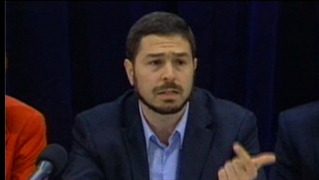
Topics
Guests
- David Coleprofessor of law at Georgetown University, co-author of Less Safe, Less Free: Why America Is Losing the War on Terror. He’s also the lead lawyer for Maher Arar, Canadian citizen and victim of the U.S. extraordinary rendition program.
- Maher Arartestifying last week by video conference before a congressional hearing.
A bipartisan group of congressmembers have personally apologized to Maher Arar, the Canadian citizen seized by U.S. officials, secretly flown to Syria, where he was tortured. Arar testified last week before a House panel, the first time he has had a chance to tell his story to U.S. lawmakers. But he couldn’t testify in person. Even though the Canadian government has cleared his name, Arar remains barred from the U.S. because the Bush administration says he poses a national security threat. [includes rush transcript]
Transcript
AMY GOODMAN: A group of Democratic and Republican members of Congress have personally apologized to Maher Arar. He’s the Canadian citizen who was seized by U.S. officials in 2002 at JFK Airport here in New York and secretly flown to Syria as part of the Bush administration’s so-called extraordinary rendition program. In Syria, Arar was held for more than 10 months in a grave-like cell. He was tortured and interrogated. He was released without ever being charged with a crime.
On Thursday, Maher Arar testified before a House Judiciary and Foreign Affairs Subcommittee hearing on extraordinary rendition. It marked the first time Arar had a chance to tell his story to U.S. lawmakers, but he couldn’t testify before Congress in person. Even though the Canadian government has cleared his name, Arar remains barred from entering the United States, because the Bush administration maintains he poses a national security threat. He’s on a no-fly terrorist list.
In a moment, we’ll play Maher Arar’s testimony and be joined by Democratic Congressmember Jerrold Nadler of New York, but first I want to go back to David Cole, the law professor at Georgetown University who’s co-counsel for Maher Arar.
Welcome to Democracy Now!, David Cole.
DAVID COLE: Thanks, Amy.
AMY GOODMAN: I wanted to ask you about the case overall and the significance of Maher Arar testifying.
DAVID COLE: Well, I think this was huge. I mean, we would have, of course, liked him to be able to testify in person, but the United States government is still keeping him out of this country. You know, he went back to Canada. Canada investigated his case with a commission headed up by a Supreme Court justice. They issued a thousand-page report. They found — they fully exonerated Mr. Arar. They apologized. They paid him damages. And yet, the United States still won’t even let him come into the country, even though it’s been established that the only basis they had for sending him to Syria at all was Canada’s misinformation that Canada provided him. We won’t let him in the country. We won’t apologize.
And in the case that we’ve brought against him, the government argues, number one, that he has no rights whatsoever, because he’s not an American, he’s a Canadian, and, number two, the whole process of rendering him to Syria is a state secret, and therefore the courts can’t adjudicate the matter, even if it was a violation of fundamental human rights and constitutional freedoms.
AMY GOODMAN: David Cole, I wanted to ask you about a piece that appeared in the Toronto Globe and Mail on Saturday. I was in Canada this weekend and picked it up. It was just two days after Maher Arar testified before Congress. The article called “Why US Won’t Remove Arar from No-Fly List.” And the article said, “Maher Arar’s denials that he ever went to Afghanistan are contradicted by a man convicted of immigration fraud and a self-confessed mujahideen instructor who says he spotted him there in the early 1990s, according to classified American documents seen by The Globe and Mail.
“The intelligence documents are said by U.S. sources to be key to understanding Washington’s argument that, even though Mr. Arar has been cleared of any wrongdoing and paid $10-million in compensation by the Canadian government, he should remain on a no-fly list and remain barred from entering U.S. territory as an alleged security threat.
“Until now, the files have been accessible only to those with security clearance, and appear to be the invisible hurdle as Mr. Arar fights to clear his name in the United States.”
Again, this based on a man who has been imprisoned in Minneapolis, according to his statements. Maher Arar has said the only thing he knows about him is that he once brought his car to be fixed by his brother in Montreal. Your response, David Cole?
DAVID COLE: Well, I mean, here you’ve got a guy who has been convicted of fraud sitting in jail for lying, and he says, “Well, I think I remember spotting Mr. Arar in Afghanistan more than 10 years ago.” How reliable is that? Mr. Arar has said point blank he’s never been to Afghanistan, period.
The Canadians spent months and months investigating this case. They fully exonerated him, found that there was no evidence whatsoever. The Canadians even came to the United States and looked at the classified evidence that the government had regarding Mr. Arar, and they came away saying this doesn’t change our opinion in one way at all. We find that there’s no basis for believing that he’s engaged in any wrongdoing and that he poses any danger to anybody.
So, you know, I think the government is sort of reaching to try to justify a completely unjustifiable act. And, you know, the bottom line, of course, is, no matter what, even if Mr. Arar were not innocent — it turns out he is a totally innocent person, but even if he weren’t a totally innocent person, you don’t send somebody to Syria to be tortured, period. That’s — end of story. So I think the government is trying to pull at, you know, very weak reeds to justify an unjustifiable act.
AMY GOODMAN: David Cole, I want to thank you very much for being with us. David Cole, law professor at Georgetown University, co-author of the book Less Safe, Less Free. This is Democracy Now!, democracynow.org.
In a moment, we’ll be joined by Democratic Congressmember Jerrold Nadler of New York, but first we’re going to turn to Maher Arar, himself, well, his testimony last week before Congress. He spoke via video conference because he’s still barred from entering the United States.
MAHER ARAR: Let me be clear. I am not a terrorist. I am not a member of al-Qaeda or any other terrorist group. I am here today to tell you about what happened to me and how I was detained and interrogated by the United States government, transported to Syria against my will, tortured and kept there for a year.
Upon viewing my valid Canadian passport, an immigration officer pulled me aside. Officers from the FBI and the New York Police Department arrived and began to interrogate me. My repeated requests for a lawyer were all denied. I was told that I had no right to a lawyer, because I was not an American citizen.
I was then taken to the Metropolitan Detention Center in Brooklyn, where I was kept for the next ten days. After five days of repeated requests, I was finally allowed to make a brief phone call to alert my family of my whereabouts.
On October 8th at 3:00 in the morning, I was awakened and told that they had decided to remove me to Syria. By then, it was becoming more and more clear to me that I was being sent to Syria for the purpose of being tortured. There, I was put in a dark underground cell that was more like a grave. It was three feet wide, six feet deep and seven feet high. Life in that cell was hell. I spent 10 months and 10 days in that grave.
During the early days of my detention, I was interrogated and physically tortured. I was beaten with an electrical cable and threatened with a metal chair, the tire and electric shocks. I was forced to falsely confess that I had been to Afghanistan. When I was not being beaten, I was put in a waiting room so that I could hear the screams of other prisoners. The cries of the women still haunt me the most.
After 374 days of torture and wrongful detention, I was finally released to Canadian embassy officials on October 5, 2003.
These past few years have been a nightmare for me. Since my return to Canada, my physical pain has slowly healed, but the cognitive and psychological scars from my ordeal remain with me on a daily basis. I still have nightmares and recurring flashbacks. I am not the same person that I was. I also hope to convey how fragile our human rights have become and how easily they can be taken from us by the same governments that have sworn to protect them.
AMY GOODMAN: Maher Arar, testifying last week by video conference before a congressional hearing.
Democratic Congressmember Jerrold Nadler of New York joins us now from Capitol Hill. He is the chair of the Judiciary Subcommittee on the Constitution, Civil Rights and Civil Liberties. Congressmember Nadler, your response to Maher Arar’s testimony and that he couldn’t testify before you in person?
REP. JERROLD NADLER: Well, I, as did other members of the committee, apologized on behalf of the American people for the disgusting treatment to which our government, I believe, knowingly subjected him. The fact that he couldn’t testify in front of our committee is completely unjustified, because our government, despite no compelling evidence for it, that keeps him on a terrorist list, on a no-fly list, won’t let him into the country even to testify at our request, because we had requested that he be let into the country to testify before our subcommittee, and that was refused.
I believe that what happened here was that the United States government consciously and deliberately conspired with the government of Syria to have him tortured. That’s why he was rendered to Syria. This was not a case of expedited removal, as the attorney general, I believe, untruthfully testified to our subcommittee. And I think this violates the criminal statute against torture. The obvious — the only reason to send him to Syria was to have him tortured. The fact that we sought assurances, diplomatic assurances, from a country that’s on the State Department terrorist list and that’s been on the list for 10 years of countries that routinely practice torture is obviously a joke.
AMY GOODMAN: There are believed to be thousands of cases of the U.S. engaging in this extraordinary term, “extraordinary rendition,” which many just say is White House for “kidnapping.” How is Congress, now run by Democrats, dealing with this? How do you get at this issue?
REP. JERROLD NADLER: Well, it’s very difficult to get at the issue when the Justice Department won’t prosecute cases. We’re holding hearings and investigating to bring some of these facts to light. It’s already — we can’t make it a criminal act, because it’s already a criminal act. So I’m not — besides bringing this to light and referring this to the Justice Department for prosecution, I’m not sure what we can do.
AMY GOODMAN: You’re calling for the U.S. to apologize to Maher Arar?
REP. JERROLD NADLER: Oh, absolutely. The U.S. should apologize to him. The U.S. should compensate him. The Canadian government voted $10.5 million compensation for their role in it. We should probably do at least that, perhaps a lot more, because our role was a lot worse than their role. And I believe some of the officials who were involved in this should be held to account.
AMY GOODMAN: It was Stephen Harper, the Bush ally, the prime minister of Canada, who announced the $10 million the Canadian government was giving to Maher Arar. And it’s interesting to see a Bush ally castigate the Bush administration over this issue, over sending him to a country that President Bush himself said walks down the road of terrorism.
REP. JERROLD NADLER: Well, and the State Department annual human rights report says that they not only practice — says that they routinely torture people. So we had every right — every reason, I should say, to expect that he would be tortured, if he were given to them under circumstances that suggested to them that the United States government suspected him of being a terrorist.
Now, since he’s — now, notice what happened here. He didn’t try to enter the United States. The expedited removal statute is designed to stop people from coming into the United States who don’t have proper documents and to give us an expedited way — I opposed its enactment, but it’s supposed to give us an expedited way, without going before an immigration judge, of preventing someone who’s illegal from entering the United States in the first place — that is, whose presence in the United States would be illegal. But he wasn’t seeking to enter the United States; he was changing planes at Kennedy on a flight from Europe to Canada. If we suspected him of something, we should simply have sent him on to Canada, which is a foreign country. He wasn’t seeking to enter the United States. Instead, we chose to send him to Syria, where he had been born and where he lived until he was a teenager, but otherwise he had no connections with them. And the only obvious reason to do that is to have him tortured.
AMY GOODMAN: What about the companies that are involved with extraordinary rendition? For example, there’s this other case of Khalid El-Masri, the German citizen who was the victim of extraordinary rendition. Aero Contractors has been closely involved, connected to the CIA’s rendition program and was involved with El-Masri’s torture and kidnapping. Germany recently issued arrest warrants for three — at least three — of Aero contractors involved in his case. It’s based, I believe, in North Carolina.
REP. JERROLD NADLER: Well, a company that only did this in Germany would be subject to German law, not to American law. They did nothing illegal in the United States, I would assume. But they would certainly be subject to German law, which — I mean, this would be kidnapping. I assume it’s a serious offense — it ought to be — in Germany. And, of course, if the United States is snatching someone off the streets of a foreign country and sending him to a third country to be tortured or, for that matter, not be tortured, that’s frankly a kidnapping. And most countries have laws against kidnapping. And, in fact, arrest warrants have been issued in both Italy and Germany against CIA agents who conspired in this. And I think it’s very wrong for the United States to be ordering employees of the United States — that is, CIA agents — to violate the laws of friendly countries and to subject them to prosecution.













Media Options